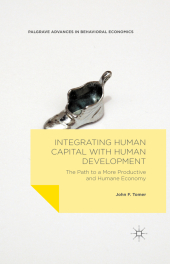 Neuerscheinungen 2015Stand: 2020-02-01 |
Schnellsuche
ISBN/Stichwort/Autor
|
Herderstraße 10
10625 Berlin
Tel.: 030 315 714 16
Fax 030 315 714 14
info@buchspektrum.de |

John F. Tomer
Integrating Human Capital with Human Development
The Path to a More Productive and Humane Economy
1st ed. 2016. 2015. xii, 231 S. 216 mm
Verlag/Jahr: SPRINGER PALGRAVE MACMILLAN; PALGRAVE MACMILLAN US 2015
ISBN: 1-349-56359-5 (1349563595)
Neue ISBN: 978-1-349-56359-3 (9781349563593)
Preis und Lieferzeit: Bitte klicken
For the most part, human capital theory emphasizes human cognitive development and the acquisition of knowledge and skills that enable enhanced productivity and earnings. In light of recent research findings, particularly concerning neurodevelopment and early childhood development, it is becoming apparent that this standard version of human capital theory has a far too limited conception of human capabilities and how they are created. Integrating Human Capital with Human Development considers recently accumulated knowledge related to the human brain´s functioning and development to better understand the relationship between human capital and human development in successful economies. It shifts the focus of human capital theory to give full consideration to intangible, non-cognitive aspects of learning. This exciting new volume is an important addition to the study of human capital and behavioral economics more broadly.
PART I: INTRODUCTION
1. Introduction
PART II: HUMAN CAPITAL AND HUMAN DEVELOPMENT
2. Integrating Human Capital with Human Development: Towards a Broader and More Human Conception of Human Capital
3. Investments in Human Capital to Remedy Decision-Making Errors
4. Smart Persons and Human Development: The Missing Ingredient in Behavioral Economics
PART III: HUMAN CAPITAL AND SOCIO-ECONOMIC DYSFUNCTION
5. Adverse Childhood Experiences, Poverty and Inequality
6. What Causes Obesity? And Why Has It Grown So Much?
7. Intangible Capital, Chronic Ailments, and Other Persistent Socio-Economic Problems
PART IV: REMEDYING SOCIO-ECONOMIC DYSFUNCTION
8. Stemming the Tide of Obesity
9. Toward Lasting, Significant Improvement in Our Socio-Economies
PART V: CONCLUSION
10. Conclusion
"This book provides insights into how non-cognitive variables might feed into the productivity machine and also how they might impact broader dimensions of human development. ... this book provides some important insights on the causes of significant socio-economic problems. Tomer does this by articulating a modeling narrative which he refers to as a human development framework that incorporates human capital (cognitive skills) and non-cognitive skills and understandings." (Morris Altman, Journal of Bioeconomics, Vol. 19, 2017)
John F. Tomer is Emeritus Professor of Economics at Manhattan College, USA. He is a founder and past President of the Society for the Advancement of Behavioral Economics. Tomer´s research areas are behavioral economics and human capital. He has written three books and 50 articles.


